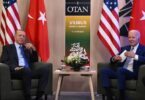David Vergun
WASHINGTON: The 2022 National Defense Strategy identifies China as the Defense Department’s pacing challenge, said the assistant secretary of defense for Indo-Pacific security affairs.
Speaking yesterday at the Politico Defense Summit, Ely Ratner said that as a direct result of this strategy, the Indo-Pacific is the priority theater with a focus on integrated deterrence, along with a working with allies and partners in a whole-of-government approach.
Regarding Taiwan, Ratner said the goal of integrated deterrence is to dissuade Chinese President Xi Jinping from thinking there’s a rapid, low-cost way in which they can execute an invasion.
The U.S. is committed to the defense of Taiwan, he said, and that’s spelled out in the Taiwan Relations Act.
The act includes the requirement to provide Taiwan with the arms it needs to defend itself, he said. Also, there’s a considerable focus on the non-materiel side, which includes training, civil-military integration and society wide efforts.
Defense in depth is part of the strategy of denial, Ratner said, noting that the island is mountainous, as well as urban, and Beijing currently doesn’t have the capabilities to launch a successful invasion.
Also, Beijing has been watching what’s been happening in Ukraine and is most likely taking lessons from that to include seeing the economic costs on Moscow and Russia’s dismal performance on the battlefield, he said.
When the fiscal year 2023 defense budget comes out, it will be apparent that there’s a careful alignment between strategy and the spending priorities involved in integrated deterrence, he said.
That said, U.S. and DOD leadership are committed to dialog and diplomacy to ensure competition between the U.S. and China doesn’t veer into conflict, Ratner said.






